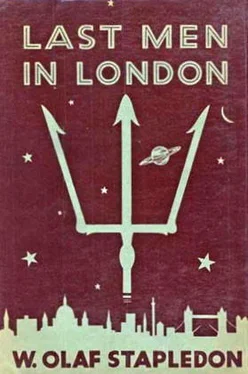But each time, when I leave the present for the past, there will have been a change in my world, a slight deterioration, sometimes perhaps imperceptible. The climate will have grown hotter and more unwholesome. The inescapable rays of the mad sun will have done more harm to eyes and brains. Society will perhaps no longer be perfect, rational conduct no longer invariable, telepathy perhaps already difficult; and very probably the racial mentality will have already become impossible. But also the exploration of the past will be advancing toward completion, though with increasing difficulty; and the dissemination of the seed of life will be at last begun.
The Last Men can look forward without dismay to the inevitable deterioration of all that they cherish most, to the death of their fair community, and to the extinction of the human spirit. We have only one desire, namely that our two tasks may be accomplished; and that happily they may be accomplished before our deterioration is so far advanced as to make us incapable of choosing to put an end to ourselves when at last we are free to do so. For the thought is somewhat repugnant to us that we should slowly sink into barbarism, into the sub-human, into blind and whimpering agony, that the last of Man should be a whine.
This may well happen, but even by such a prospect we are not seriously dismayed. If it does occur, it will doubtless seem intolerable to our degraded spirits. But today, we are fully possessed of ourselves. Even as individuals, even apart from the exaltation of racial mentality, we can accept with resignation, nay with a surprising fervour of appreciation, even the moral downfall of our world. For we have gone far. We have drunk deeply of beauty. And to the spirit that has drunk deeply of the grave beauty of the cosmos, even the ultimate horror is acceptable.
4. EPILOGUE BY THE TERRESTRIAL AUTHOR OF THIS BOOK
Readers of my earlier book, Last and First Men, may remember that it closed with an epilogue which my Neptunian controller claimed to have transmitted to me from a date in Neptunian history many thousands of years after the communication of the body of the book. The present book was obviously originated at a Neptunian date shortly after the transmission of the main part of the earlier book, but very long before its epilogue. Now I have reason to believe that at some date long after the communication of that former epilogue itself, my controller attempted to give me an epilogue to the present volume, but that owing to the serious disintegration of the most delicate brain tracts of the Last Men, and the gradual break-up of their world society, the result has been extremely confused and fragmentary.
I shall now attempt to piece together the random thoughts and passions, and occasional definite statements, which have come into my mind seemingly from my Neptunian controller. By supplementing them with a careful use of my own imagination, I shall try to construct a picture of the state of affairs on Neptune when the disaster was already far advanced.
From the vague flood of intimations that has come through to me I gather that the hope of disseminating a seed of life abroad among the stars, before the disaster should have extinguished man’s powers, was not fulfilled. The dissemination had indeed actually been begun, when it was discovered that the vital seed was all the while being destroyed in the process of scattering. This trouble, and other unexpected difficulties, which occurred seemingly at some date after the communicating of the earlier epilogue, not merely delayed the enterprise, but even led to its abandonment for some thousands of years. Then some new discovery in psychophysics raised a hope of achieving the Dissemination by an entirely new method. A vast new enterprise was therefore set on foot; but was seriously hampered by the increasingly cruel climate, the steady deterioration of mental calibre, the ceaseless national wars and civil confusion. It would seem, though the inference is by no means certain, that at the date of this final and intermittent communication, the Dissemination had already ceased for ever; whether because it had been successfully accomplished or because it was no longer physically possible, or because the will to pursue it had already been broken, I cannot ascertain. Probably the work was now beyond the powers of a degenerate and disorganized world-community.
The other great task which the doomed population had undertaken to complete before its final downfall, the Exploration of the Human Past, seems to have been in a manner finished, though in less detail than was originally planned. Several communications suggest that such workers as remained able and willing to enter into the past were trying to concentrate their failing powers on certain critical points of Man’s career, so as to reconstruct at least these moments in full minuteness. But as the racial mode of mentality had already become impossible, and as the individual explorers had evidently very seriously deteriorated, it seems clear that such data as were still being collected would never be incorporated in the single racial consciousness, in the aesthetic apprehension of the Cosmos by the fully awakened Spirit of Man. In fact the continuation of the work of exploring the past seems to have become as automatic and irrational as the aimless researches of some of our Terrestrial historians.
In the epilogue to the earlier book it was reported that, as the higher and more recent brain-tracts were corroded by the fury of ultra-violet solar radiation, the surviving members of the community suffered a harrowing struggle between their nobler and their baser natures, a struggle which issued inevitably in the defeat of all that was most excellent in them. At the date of the epilogue to the present book, the race seems to have been reduced to a remnant of distraught and almost sub-human beings clustering round the South Pole, which, one may suppose, was the only region of the planet still capable of supporting human existence at all. The life of this remnant must have been completely aimless and abject. It apparently consisted of half-hearted agriculture, occasional hunting expeditions against the wild creatures that had been driven south by the heat, and frequent predatory raids of neighbouring groups to capture one another’s food and women.
The population was evidently obsessed by the terror of death, of starvation, and above all of insanity. The death-rate must have been very high, but there was also a huge birthrate. Conception was no longer controlled. Invalid children seem to have composed a large proportion of the population. Parenthood and sex evidently bulked very largely in the popular mind. There were wild sexual orgies, which apparently had acquired some religious significance; and there was a vast ritual of superstitious taboos, most of which seem to have been intended to purify the soul and prepare it for eternal life. Apparently some divinity, referred to as the God of Man, was expected to destroy the world by fire, but to snatch into eternal bliss those who had kept all the taboos. His Younger Brother, it seems, had already appeared on Neptune, but had been killed by his enemies. This legend should, perhaps, be connected in some way or other with the superior being who, in the epilogue to the previous book is referred to as ‘this younger brother of ours’.
Not every one succumbed to these superstitions. My controller himself rejected them, and retained a pathetic loyalty to the ancient wisdom, some shreds of which he now and then remembered. But I have reason to believe that very often his memory of them was but a verbal formula, without insight.
Clearly, for those who, like my controller, had kept alive in themselves something of the former purpose of the race, there was now no longer any reason to refrain from racial suicide. The two enterprises for which euthanasia had been postponed could no longer be usefully continued. But the unhappy members of what had once been the noblest of all human communities had no longer the courage or the common sense to destroy themselves. Those who accepted the popular superstitions declared that the God had forbidden men to seek death before their time. Those who rejected the doctrine of salvation persuaded themselves that they refrained from suicide because to flee was cowardly.
Читать дальше












